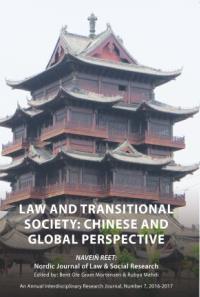Viewing the Labor Law Reform in China From a Perspective of Legal Globalization
DOI:
https://doi.org/10.7146/nnjlsr.v0i7.111014Abstract
After the cold war, the trends of legal globalization became more and more obvious. People’s Republic of China (PRC) began its connection with the international community and the global market, and its legal reform after the launch of the “reform and opening-up” policy. By examining China’s labor law reform, we can see how legal globalization has influenced China’s legal system. China introduced and transplanted many institutions, terms of ILO conventions during its labor law reform. It also accepted many principles and conceptions of ILO conventions in its labor law and constitutional law, which would shape China’s labor law reform. Multinational corporations (MNC) and transnational civil society organizations (TCSO) influenced Chinese labor law reform through lobbying, advocacy, public education, and litigations. Informal norms such as Corporate Social Responsibility standards developed by MNCs and TSCOs also inspired Chinese legislators to improve China’s labor law and Chinese SCOs or business associations to develop labor standards to fill the gaps in China’s labor law and regulations. In conclusion, in the age of legal globalization, the labor law reform in China is a kind of legal transplantation. International norms, actions by multinational corporations and transnational civil society, and their informal norms together constitute the force which promotes the transplantation and the reform of China’s legal system.
Key Words: legal globalization, global governance, labor law, law reform
Downloads
Published
How to Cite
Issue
Section
License
Counting from number 12 (2022), articles published in NNJLSR are licensed under Attribution 4.0 International (CC BY 4.0). Readers are allowed to copy and redistribute the articles in any medium or format, to adapt and revise the articles, and use the articles for commercial purposes, provided that the readers give appropriate credits.
No Creative Commons licenses are applied on articles in number 1 (2009)-11 (2021). All rights reserved by the authors. Readers are allowed to download, read, and link to the articles published in volume 1 (2009)-11 (2021), but they may not republish or redistribute these articles without permission of the authors.

